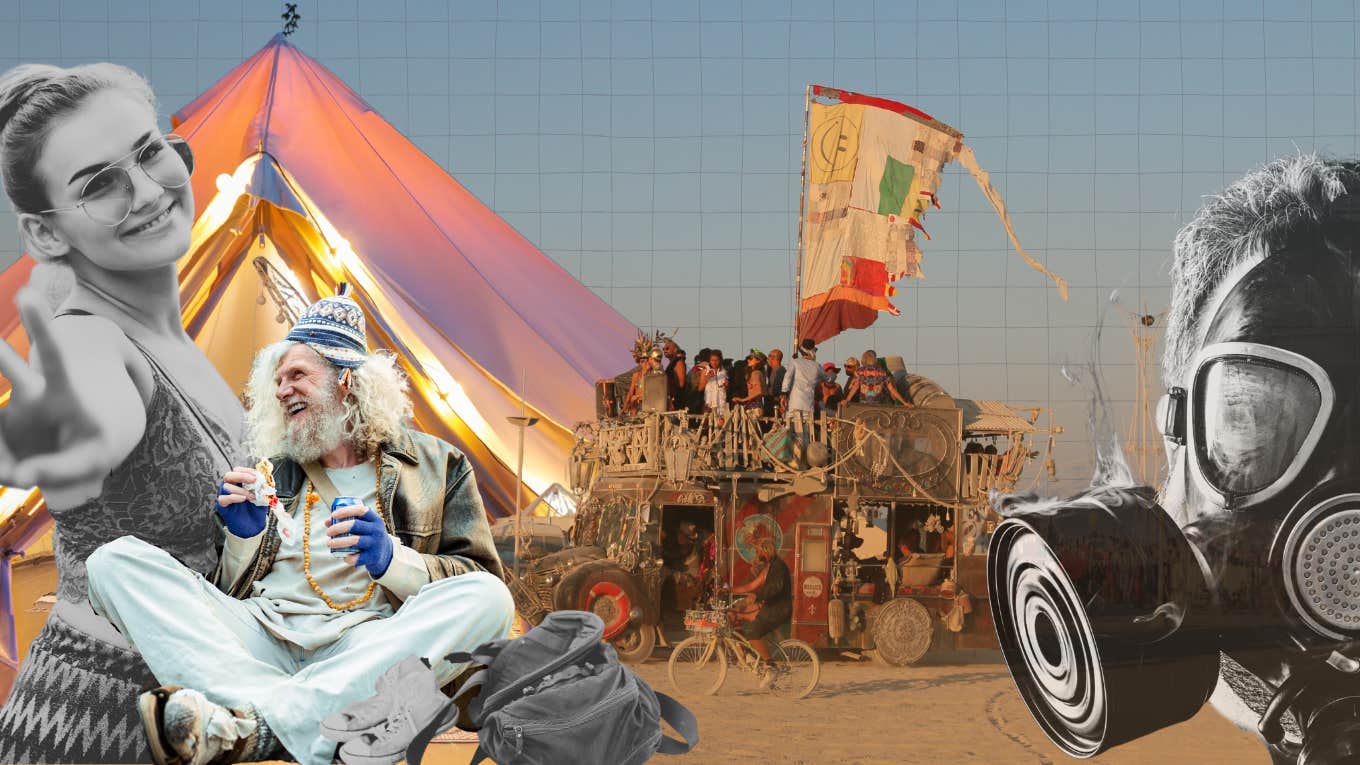'Burning Man' Has Turned Into A Place Where Rich People Can Cosplay As 'Poor'
What began as a festival centered on 'inspiring a sense of culture' has turned into its own antithesis.
 Brainsil, yacobchuk, artempesetsky, FRIMU EUGEN, halfpoint, Following NYC via Canva
Brainsil, yacobchuk, artempesetsky, FRIMU EUGEN, halfpoint, Following NYC via Canva In its current iteration, Burning Man is a week-long self-sustaining festival that takes place in the Black Rock Desert, about 120 miles outside of Reno, Nevada.
According to the ethos of the Burning Man Project, the festival exists to “bring experiences to people in grand, awe-inspiring and joyful ways that lift the human spirit, address social problems, and inspire a sense of culture, community, and civic engagement.”
Around 80,000 people descend onto the barren landscape, ready to practice a mindset of “radical self-reliance,” as the festival is a “commerce-free” zone — attendees bring everything they need in with them.
But critics of Burning Man claim the festival has turned into a place for rich people paying to be 'poor.'
Tickets for Burning Man are sold in a price-tiered structure, starting at $525 and going up to $2,750. No matter what a person ends up paying, everyone there is provided the same level of access to amenities and events.
In addition to buying tickets, festival-goers pay for parking and camping and are responsible for bringing in their own supplies, like food, water, and anything else they might need. They abide by a "leave no trace" mentality, taking any waste they produce out of the desert after the festival ends.
An article published in SFGate estimated that the total cost of going to Burning Man ranges from around $1,000 to $10,000.
Footage of Burning Man 2023 uploaded to TikTok featured the festival’s harsh environment, showing people camping in the desert, with their clothes, faces, bodies, and tents covered in thick layers of yellow-orange dust.
Many comments beneath the post called out the Burning Man experience as one where rich people pay to "be poor," noting the price tag of attending the festival.
One person even referred to Burning Man attendees as paying for the experience of 'manufactured struggle.'
In 2016, The Guardian published an interview with Marian Goodell, the CEO of Burning Man, who touted the event as a “radically creative... experiment in temporary community.”
Goodell expressed her belief that the ethos of Burning Man is one that attendees carry out of the desert, into their actual lives, proclaiming, “There’s different work being done all over the world in these Burning Man communities — and they’re actually doing real community work... They do it around the Burning Man concept, because they know there’s wider trust in our structural and organic approach.”
“If you’ve been to Burning Man, you’re nice to your neighbor,” she continued. “It’s about taking it into communities and helping other people.”
Goodell made the claim that “Burning Man helps people connect with each other more authentically.”
Yet even in 2016, Goodell noted a demographic shift in the type of people attending the festival. She commented, “There is definitely a wealthier element coming to Burning Man, but if you look at the event as a possible cultural force of change in the world, then you want to have everyone from all walks of life.”
One woman who went to Burning Man for the first time documented her initial reactions to the festival in a TikTok post, exclaiming, “It’s just so beautiful. Everyone’s themselves, unapologetically. It makes you question your own sense of reality. And it feels like love, and community, and acceptance... and just humanness.”
In a separate TikTok, the same woman posted footage of the showers that were included in the cost of tickets. She filmed the rudimentary structure, explaining, “You fill your bucket with water right here, and then you wave your FOB in front and the water comes out.”
“You basically have 8 seconds to rinse off,” she exclaimed. “Oh, it got in my mouth! That was not good. It tastes like vinegar.”
There are certainly aspects of Burning Man to celebrate, including some of the festival’s espoused principles of radical inclusion, decommodification, communal effort, and radical self-expression.
Yet one could wonder who’s actually able to access this week of radical existence after factoring in travel costs, time off from work, and how much money is spent on supplies, in order to maintain the self-sufficiency that Burning Man requires.
Alexandra Blogier is a writer on YourTango's news and entertainment team. She covers social issues, pop culture analysis and all things to do with the entertainment industry.

